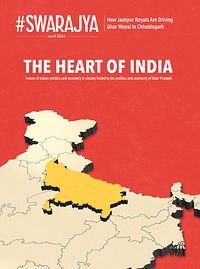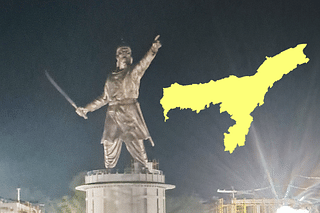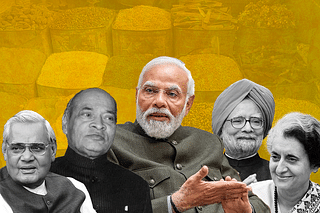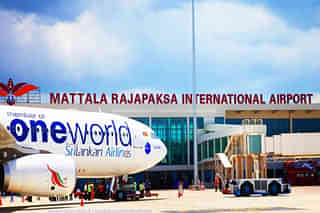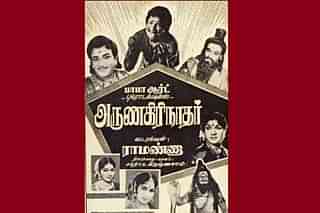Blogs
Genocide Of Kashmiri Pandits: Reconciliation And The Way Ahead
Rahul Pandit
Aug 29, 2021, 07:00 PM | Updated 07:00 PM IST
Save & read from anywhere!
Bookmark stories for easy access on any device or the Swarajya app.
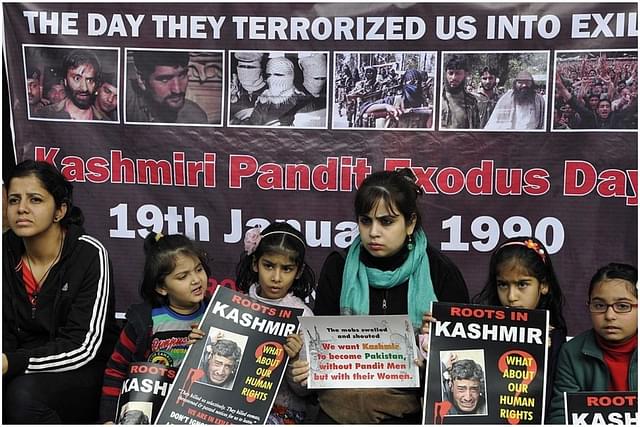
Both my daughters were enjoying meditative serenity in the gardens of the Hazratbal mosque at Srinagar with birds in the azure skies above and the green waters of the Dal lake caressing it below.
They had finished offering prayers at the shrine on their first trip to the valley in 2016.
“What happened was wrong. I pray every day for Pandits to return” Sh. Ghulam Hassan Banday, the pious and fatherly Custodian of the Holy Relic of Prophet Muhammad, was speaking to my in-laws, tears welling up his eyes. I felt his sincerity, I was home.
This reverie was broken with the memories of the pogrom and the forced exodus of 400,000 Kashmiri Pandits from the valley in the 90s. Author of 24 books, freedom fighter and poet Pandit Sarwanand Koul Premi and his son Pandit Virendra Koul were abducted from their house in village Soaf Shali, Anantnag.
Their bodies were found hanging from a tree a day later with the limbs broken, hair uprooted and portions of skin slit open. Before being shot, the killers had hammered nails between their eyebrows and mutilated the bodies with cigarette burns.
Girija Tikoo, a 21-year-old laboratory assistant at the Government High School, Trehgam, Kupwara, was abducted, brutally gang-raped and cut into two halves on a saw mill while still alive.
This mayhem continued for over a decade to accelerate the pace of ethnic cleansing. Panun Kashmir, an organisation of displaced Kashmiris, has published a list of 1,341 murdered Kashmiri Pandits.
Names of prominent Pandits were pasted on ‘hit list’ posters and their murders celebrated. Widely read newspapers Aftab and Alsafa carried advertisements asking Hindus to leave or risk being eliminated.
Temples were desecrated and burnt, homes and shops of Kashmiri Hindus were looted and destroyed. Mosque speakers blared ‘raliv, tsaliv ya galiv’ i.e. convert, run away or be killed and raped.
I remember my grandparents escaping the valley but dying outside since they were not used to the heat. They were also traumatised — treated as second-class citizens forced to leave their respect, land, orchards and generational homes behind.
Children used to sleeping on pashmina died of snake bite sleeping on the barren land of the squalid tented refugee camps.
The Indian state’s pusillanimity left the Kashmiri Pandits to fend for themselves. While mass hysteria engulfed the valley, many families were also saved and clandestinely helped escape by their Muslim neighbours.
Government of India records 64,951 displaced Kashmiri families. It is a dubious distinction for the world’s largest democracy to also be the nation whose citizens are refugees within their own country.
The UN Genocide Convention of 1948 defines “genocide” as an act with the intent to destroy an ethnic group, including the killing of its members. In 1995, the National Human Rights Commission headed by the former Chief Justice of India, M. N. Venkatachaliah, held the systemic ethnic cleansing of Kashmiri Pandits akin to genocide.
Steeped in Shaivism that exhorts compassion and forgiveness, Pandits did not let the venom of hatred grow deep inside or plot violent retribution. They resolved instead to a code of morality and pursuit of education.
That is why the entire community over the past two generations, including all its women, are 100 per cent literate. While you can easily find Kashmiri Pandit doctors, teachers, engineers, scientists, judges, civil servants, Generals, actors and even hoteliers, you will find it difficult to name one Kashmiri Pandit terrorist, criminal or thief even today.
Those who forget history are condemned to repeat it. Natives of the land established by Rishi Kashyap, this is Kashmiri Pandits seventh forced exodus from their birthplace since the 16th century advent of the Mughal empire in the valley.
So, what should be done now to move forward and obviate a recurrence?
Acceptance and apology: Acceptance is half the walk to closure. It is important to prevent the assassination of India’s memory from denying or minimizing this savagery of slaughter.
‘”In silence wounds deepen, in remembrance wounds heal”, President Joe Biden said recently remembering the 1921 Tulsa race massacre in America.
The Prime Minister must issue an apology in the Parliament for India’s failure in preventing the genocide of Kashmiri Pandits. This will help douse the embers that burn the hearts of mothers who lost their children to this pogrom.
Punish the guilty: The Supreme Court of India in 2019 rejected a PIL for the prosecution of the accused on the ground that the time gap will make it difficult to collect evidence.
Most Kashmiris say that if the SC after 36 years in 2020 can decide conviction for the 1984 anti Sikh riots, it should do so too for this genocide in the 90s.
A Judicial Commission under a retired Chief Justice of the Supreme Court should be immediately constituted, akin to the Justice G.T. Nanavati Commission, formed in 2000 to probe the 1984 riots.
Those found guilty should be given exemplary punishment as per the law. 215 FIRs that have not been acted upon by the state should be clubbed and given to the NIA for a comprehensive probe, leading to a time-bound charge sheet.
Teach the nation: As civilised human beings, we must understand how such inhumane ideas spread like wildfire in the state, instigating the organised rape, murder and plunder of a native community.
The valley needs a Centre of Kashmir Renaissance to showcase knowledge and learnings through the ages including lessons from this genocide.
Historians need to research and peel off the layers of distortion created to serve narrow political interests. They need to study and credit the Gonand, Karkota and Lohara dynasties that ruled the valley for over 1,000 years.
India’s school syllabus must include lessons from the 7th century King Lalitaditya, also called the Alexander of Kashmir, who ruled a kingdom twice the size of the Mughal empire — stretching from Afghanistan to Central Asia and major parts of India.
Class 11 and 12 syllabi must include national pride and basic human rights to guide students’ behaviour as responsible adults.
The Kashmiri language, Koshur, with its Indo-Aryan Vedic Sanskrit roots and unique Sharda script needs to be revived and included as a compulsory subject in state schools.
Koshur needs to be actively promoted as the administrative language of the state at par with Urdu.
Reparation & resettlement: Return of the exiled Pandits with pride, is a matter of enforcing India’s Constitution in Kashmir, both nationally and on the global arena.
The government must pay reparation for the families forced to flee their homes, children who were orphaned and youth who had their entire lives destroyed.
The establishment of a Reconciliation Commission, headed by a retired Supreme Court Justice, with eminent members from both the communities, will be an important first step in this direction. Its mandate should also include complaints of human rights violation against the security forces during the same period.
The “Truth and Reconciliation Commission” formed in South Africa to probe apartheid atrocities can serve as an excellent model.
Resettlement cannot just be an exercise in restoring the physical status quo pre-1990 but an enabling approach for political empowerment. A State Minority Commission, led by a retired Supreme Court Justice must be constituted.
Its ambit should include compiling a comprehensive list of the usurped lands, orchards and properties of the Kashmiri Pandits, and laying down the process to restore the same.
Its remit should also be the restoration, protection and preservation of the valley’s shrines and temple properties.
Economic revitalisation: These initiatives will succeed only if backed by an economic agenda that creates jobs for the valley’s youth and prosperity for all its citizens.
Four key sectors to drive this agenda could be 1) Sustainable Tourism 2) Holistic Healthcare 3) Geographical Indication (GI) Food Processing, and 4) Education.
India has the opportunity to make Kashmir the sustainable Tourism Capital of the World — flanked by the Zabarwan mountains and caressed by its gardens, lakes, rivers, valleys and wildlife with opportunities for golf, skiing, paragliding, river rafting, trekking, mountain climbing, camping and rural tourism.
Its salubrious climes make it an ideal choice for promoting health and healing solutions ranging from Unani, naturopathy, siddha, yoga, sports rehabilitation to sanatoriums, detox clinics and holistic fitness centres.
The state needs to apply for GI tagging of its produce ranging from the world’s best saffron to dairy, meats and fruit to hand knotted carpets and walnut wood carvings.
Government needs to incentivise the establishment of small and micro food processing enterprise and promote a people’s cooperative, a la Amul, to export Kashmir’s culinary secrets to the world.
Kashmiris should be exhorted to commit their intellectual capital and establish the Eton of the East and the Oxford of the Orient in the tranquil settings of their homeland.
A corporate tax holiday to these priority sectors, and a zero personal tax regime, will incentivise the diaspora to return and rebuild their motherland.
An empowered Kashmir Economic Resurgence Council led by the Niti Aayog Chairperson should supervise a roadmap for accelerated implementation of this agenda.
The acceptance of a shared culture and admittance of the integrity of the other’s experience will initiate the process of healing, helping wash dirty blood stains of the genocide off India’s fabric.
Lord Rama was exiled for 14 years, Kashmiri Pandits have now been in exile for over 30 years. It is time for India to get them home.
Save & read from anywhere!
Bookmark stories for easy access on any device or the Swarajya app.
Rahul Pandit is Member, National Tourism Committee, Confederation of Indian Industry (CII).
Introducing ElectionsHQ + 50 Ground Reports Project
The 2024 elections might seem easy to guess, but there are some important questions that shouldn't be missed.
Do freebies still sway voters? Do people prioritise infrastructure when voting? How will Punjab vote?
The answers to these questions provide great insights into where we, as a country, are headed in the years to come.
Swarajya is starting a project with an aim to do 50 solid ground stories and a smart commentary service on WhatsApp, a one-of-a-kind. We'd love your support during this election season.
Click below to contribute.
